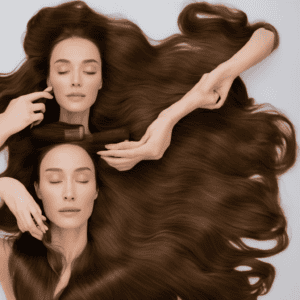You’ve likely invested in a hair oil claiming to combat dryness, but a staggering 75% of hair care products make unsubstantiated claims. Be cautious of marketing tactics that promise more than they deliver. Some hair oils might even exacerbate dryness with harsh ingredients like sulfates, parabens, and mineral oil. To really fight dryness, you need to understand what makes a hair oil effective. Look for nourishing ingredients like argan oil, coconut oil, and shea butter that provide hydration and repair. Ahead, you’ll discover how to separate fact from fiction and find the right hair oil for your unique locks.
Debunking the Dryness-Fighting Claims
While many hair oils claim to be the ultimate solution for dryness, you might be surprised to learn that some of these claims are exaggerated or even misleading. The reality is that there’s a lack of strict hair oil regulations, allowing manufacturers to make unsubstantiated claims about their products. This lack of oversight creates an environment where marketing tactics can be misleading, making it difficult for you to make informed decisions about the products you use.
You’ve probably seen ads claiming that a particular hair oil can ‘repair’ or ‘nourish’ your hair, but what does that really mean? These terms are often used loosely, without any scientific backing. Some manufacturers might use buzzwords like ‘hydrating’ or ‘moisturizing’ to make their products sound more appealing, but these claims mightn’t be supported by actual evidence. As a consumer, it’s essential to be aware of these tactics and take claims with a grain of salt. By being more discerning, you can make better choices about the hair oils you use and avoid falling prey to misleading marketing strategies.
Ingredients to Avoid in Hair Oils
When selecting a hair oil, you’ll want to steer clear of ingredients that can exacerbate dryness or cause other unwanted effects. Some hair oil additives can do more harm than good, so it’s essential to read labels carefully. Synthetic fragrances, for instance, can strip your hair of its natural oils, leading to further dryness and damage. These artificial scent agents can also trigger allergic reactions, itchiness, and irritation on the scalp.
Another ingredient to avoid is mineral oil, a petroleum-based derivative that can suffocate your hair follicles and prevent moisture from penetrating the hair shaft. Similarly, silicones like dimethicone and cyclomethicone can create a barrier on the hair’s surface, preventing nourishing ingredients from being absorbed.
Additionally, be cautious of hair oils containing harsh chemicals like sulfates, parabens, and phthalates, which can strip your hair of its natural oils and cause long-term damage. By being mindful of these ingredients, you can make an informed decision when choosing a hair oil that truly combats dryness.
Moisturizing Myths and Misconceptions
Your hair care routine might be sabotaged by common misconceptions about moisturizing, which can lead to dryness, breakage, and frustration. You might think you’re doing everything right, but you could be unwittingly perpetuating dryness.
One major myth is that hair oil can instantly transform your locks, meeting all your hair expectations. The truth is, hair oil isn’t a magic solution that can single-handedly solve dryness. It’s just one part of a comprehensive hair care routine.
Another myth is that all hair oils are created equal. This couldn’t be further from the truth. Different oils have different properties, and some mightn’t be suitable for your hair type. Don’t fall for oil myths that claim a single oil can solve all your hair problems.
Understand that everyone’s hair is unique, and what works for someone else mightn’t work for you. By recognizing these misconceptions, you can adjust your hair care routine to truly combat dryness and achieve the healthy, vibrant locks you deserve.
The Science of Hair Oil Absorption
Now that you’ve debunked common moisturizing myths, it’s time to get to the root of how hair oil absorption really works. Understanding the science behind it can make all the difference in choosing the right oil for your dry locks.
Hair oil absorption is all about the interaction between the oil and your hair’s natural lipid bilayers. These bilayers are the building blocks of your hair’s structure, and they play a crucial role in determining how well an oil is absorbed.
When you apply a hair oil, the occlusion mechanisms kick in, allowing the oil to penetrate the hair shaft. This process is dependent on the oil’s molecular structure and its ability to interact with your hair’s natural lipids. If the oil is compatible, it can effectively fill in the gaps between the lipid bilayers, providing long-lasting hydration and nourishment.
However, if the oil isn’t absorbed properly, it can simply sit on the surface of your hair, doing more harm than good. By understanding how hair oil absorption works, you can make informed decisions about the best oil for your hair type and needs.
Nourishing Ingredients to Look For
Rich in antioxidants and fatty acids, ingredients like argan oil, coconut oil, and shea butter can provide intense hydration and repair to dry, damaged locks. These nourishing ingredients can help lock in moisture, leaving your hair feeling soft, smooth, and looking healthy.
When selecting a hair oil, look for hydrating extracts like aloe vera, green tea, and chamomile, which can provide an extra layer of moisture and soothing benefits. It’s also essential to consider your hair type specificity when choosing a hair oil. If you have fine or oily hair, you’ll want to opt for a lightweight oil that won’t weigh your hair down. On the other hand, if you have dry, curly, or damaged hair, you’ll benefit from a richer, more emollient oil.
Conclusion
So, does your hair oil truly combat dryness? Not necessarily. You’ve learned that some ingredients can actually exacerbate dryness, and that absorption is key to nourishing your locks.
By being mindful of the ingredients you’re using and opting for nourishing ones instead, you can finally give your hair the moisture it craves.
Remember, it’s time to get real about what’s really going on with your hair oil – and make the switch to a truly hydrating routine.






